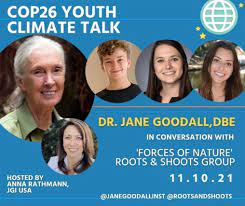By Will Charouhis, We Are Forces of Nature
As the clock winds down on the climate negotiations at the world climate conference, many experts have declared that the summit is the best last chance to save our planet.
The decisions made at COP26 in Glasgow, Scotland will be a game-changer for humanity. If we don’t achieve the action outlined at COP26, we will soon reach the irreversible tipping point where we won’t be able to maintain the habitability of our planet.
As the long venue halls of COP26 begin to empty out, there is a sense of peril that the promises made are too little and too late.
When world leaders touched down here at the start of COP26, they were greeted with cries of anger and pleas for transparency from young people who are attending the summit.

Nonetheless, there was a sense of hope that the negotiations save humanity from itself will produce important results. COP26 has been more widely attended than any other U.N. conference on climate change. With the United States participating seriously, some notable progress has been achieved.
I arrived at COP26 in the pouring rain via two cabs, two planes, and two electric buses; I contributed far more emissions than I would have liked. Outside the conference, the media have followed the frustrated youth who by day five labeled the negotiations a failure.
Two massive protests were held in the streets of Glasgow and London during the summit, with more than a 500,000 young people participating in marches.
Despite the negative press, 20 nations agreed to end all international coal financing by 2030, though the largest emitter – China — was sorely absent. Ninety nations agreed to reduce their methane reliance by 2030; 100 nations reached an agreement to halt deforestation by 2030; and India finally relented and joined 110 other countries who have agreed to bring us to net zero carbon emissions, though they won’t do so until 2070.
And on Thursday, China and the United States announced a surprise agreement to accelerate their efforts to end emissions, though there is far more celebration about the civility of the agreement than its actual content.
The press has criticized the exclusivity of COP26. I can only share my impressions. Notably, inside the conference teens are virtually absent. At age 15, I am the youngest attendee. But our generation, which will be most affected by the warming climate, has been largely unrepresented.

However, I am glad to see women are included. I had the opportunity to sit on two panels where I was the only person who identified as he/him, including the moderators.
Every world leader was invited, and every country in the United Nations had negotiators present. The venue was filled with foreign voices and native dress, so there is hope that this year’s numbers reflect inclusivity.
President Obama is an amazing speaker, and his presence added excitement. He didn’t dismiss the challenges ahead, but he encouraged the youth to move from hashtag advocacy to action. He pointed out that we will be the ones responsible over the next 30 years for the implementation of the pledges made at COP26. He recognized the anger of our generation, but warned us against the inactivity of hopelessness.
I also had an opportunity to serve on a youth panel with Dr. Jane Goodall, who was honored at COP26 for her life’s work in environmentalism. She too, focused on hope, urging young people to look forward instead of focusing on past broken promises.
But each night as the buses have pulled away from COP, I have listened to the youth on the outside of the fence. Their numbers dwindled in the freezing rain. I could clearly hear the fear and the despair in their chants.
The youth have rightfully called into question the outcomes of COP26. The promises are there to get us to 1.8 degree Celsius, but the United Nations has yet to establish meaningful enforcement powers. Worse, there is talk that commitments will not be re-visited for another five years, which will put us past the point of no return.
I watch anxiously and wonder whether the pledges made in this city will wither. We have got to double down on our commitments, finding a way to protect those least responsible for climate change but who will bear the worst of its effects.
We have to make every effort to amplify the voices of women, minorities, those from developing countries, and Gen Z.
For the first time since I started my climate work in 2018, limiting global warming to 1.8 degrees Celsius is within reach. It’s not nearly enough, and not nearly fast enough, but it’s a start. President Obama was right when he said there is no time for cynicism. It’s time to get busy.
Will Charouhis is a 15-year-old climate activist from Miami, Florida. He is the founder of Forces of Nature, a youth-led organization whose mission is to halt climate change.
“The Invading Sea” is the opinion arm of the Florida Climate Reporting Network, a collaborative of news organizations across the state focusing on the threats posed by the warming climate.



